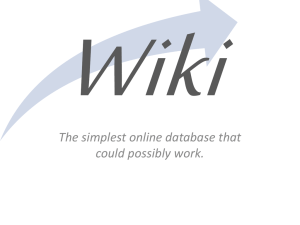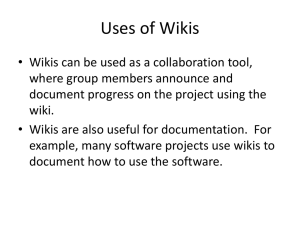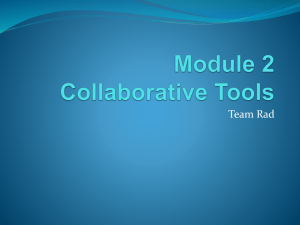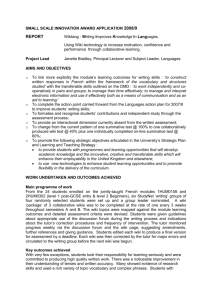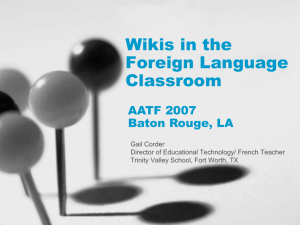7 Things You Should Know About Wikis
advertisement
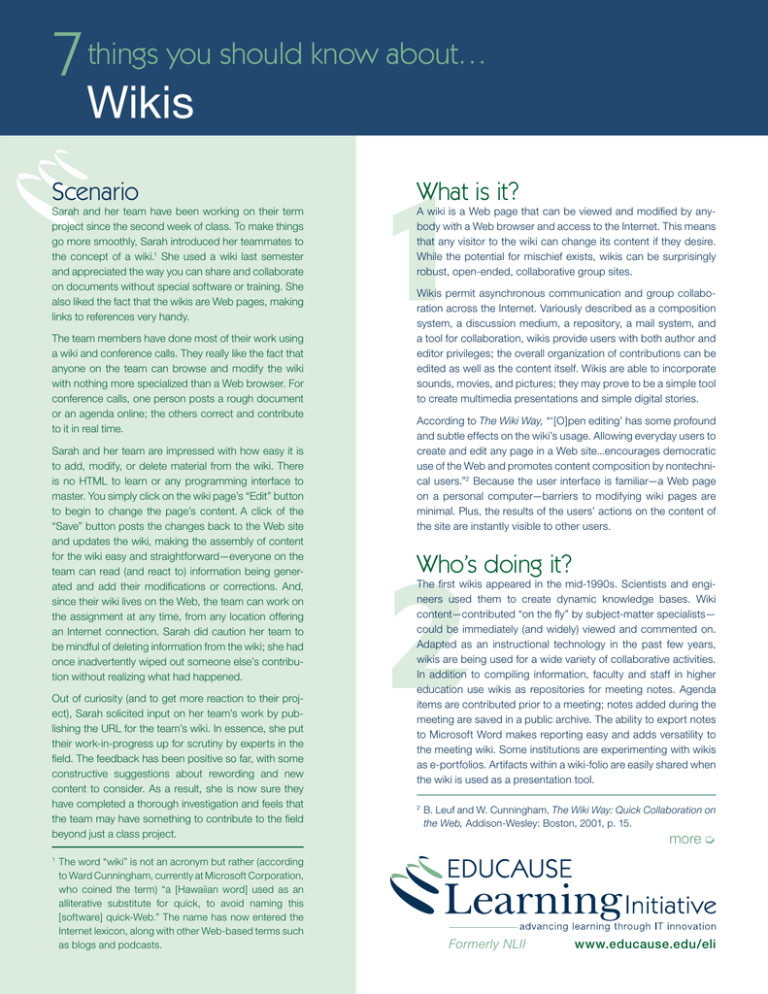
7 things you should know about… Wikis Scenario Sarah and her team have been working on their term project since the second week of class. To make things go more smoothly, Sarah introduced her teammates to the concept of a wiki.1 She used a wiki last semester and appreciated the way you can share and collaborate on documents without special software or training. She also liked the fact that the wikis are Web pages, making links to references very handy. The team members have done most of their work using a wiki and conference calls. They really like the fact that anyone on the team can browse and modify the wiki with nothing more specialized than a Web browser. For conference calls, one person posts a rough document or an agenda online; the others correct and contribute to it in real time. Sarah and her team are impressed with how easy it is to add, modify, or delete material from the wiki. There is no HTML to learn or any programming interface to master. You simply click on the wiki page’s “Edit” button to begin to change the page’s content. A click of the “Save” button posts the changes back to the Web site and updates the wiki, making the assembly of content for the wiki easy and straightforward—everyone on the team can read (and react to) information being generated and add their modifications or corrections. And, since their wiki lives on the Web, the team can work on the assignment at any time, from any location offering an Internet connection. Sarah did caution her team to be mindful of deleting information from the wiki; she had once inadvertently wiped out someone else’s contribution without realizing what had happened. Out of curiosity (and to get more reaction to their project), Sarah solicited input on her team’s work by publishing the URL for the team’s wiki. In essence, she put their work-in-progress up for scrutiny by experts in the field. The feedback has been positive so far, with some constructive suggestions about rewording and new content to consider. As a result, she is now sure they have completed a thorough investigation and feels that the team may have something to contribute to the field beyond just a class project. 1 The word “wiki” is not an acronym but rather (according to Ward Cunningham, currently at Microsoft Corporation, who coined the term) “a [Hawaiian word] used as an alliterative substitute for quick, to avoid naming this [software] quick-Web.” The name has now entered the Internet lexicon, along with other Web-based terms such as blogs and podcasts. 1 What is it? A wiki is a Web page that can be viewed and modified by anybody with a Web browser and access to the Internet. This means that any visitor to the wiki can change its content if they desire. While the potential for mischief exists, wikis can be surprisingly robust, open-ended, collaborative group sites. Wikis permit asynchronous communication and group collaboration across the Internet. Variously described as a composition system, a discussion medium, a repository, a mail system, and a tool for collaboration, wikis provide users with both author and editor privileges; the overall organization of contributions can be edited as well as the content itself. Wikis are able to incorporate sounds, movies, and pictures; they may prove to be a simple tool to create multimedia presentations and simple digital stories. According to The Wiki Way, “‘[O]pen editing’ has some profound and subtle effects on the wiki’s usage. Allowing everyday users to create and edit any page in a Web site...encourages democratic use of the Web and promotes content composition by nontechnical users.”2 Because the user interface is familiar—a Web page on a personal computer—barriers to modifying wiki pages are minimal. Plus, the results of the users’ actions on the content of the site are instantly visible to other users. 2 Who’s doing it? The first wikis appeared in the mid-1990s. Scientists and engineers used them to create dynamic knowledge bases. Wiki content—contributed “on the fly” by subject-matter specialists— could be immediately (and widely) viewed and commented on. Adapted as an instructional technology in the past few years, wikis are being used for a wide variety of collaborative activities. In addition to compiling information, faculty and staff in higher education use wikis as repositories for meeting notes. Agenda items are contributed prior to a meeting; notes added during the meeting are saved in a public archive. The ability to export notes to Microsoft Word makes reporting easy and adds versatility to the meeting wiki. Some institutions are experimenting with wikis as e-portfolios. Artifacts within a wiki-folio are easily shared when the wiki is used as a presentation tool. 2 B. Leuf and W. Cunningham, The Wiki Way: Quick Collaboration on the Web, Addison-Wesley: Boston, 2001, p. 15. more ➭ Formerly NLII www.educause.edu/eli Wikis Educators and students, as well as amateurs and professionals (artists, writers, collectors), have found wikis useful in expanding community involvement and interest in their subjects and activities. One of the most commonly used wikis is Wikipedia—an online, editable encyclopedia that is popular with students. Wikis are also making inroads as rough Web-content composition tools for both faculty and students. 3 How does it work? Technically, a wiki is a combination of a CGI script and a collection of plain text files that allows users to create Web pages “on the fly.” All it takes is a connection to the Internet and a Web browser. When you click a wiki page’s “Edit” link, the script sends the raw text file to your browser in an editable form, allowing you to modify the content of the page. Pressing the “Save” button sends the modified text back to the wiki server, which replaces the existing text file with your changed version for all to see. When you request a wiki page, the script gathers the corresponding text file, changes its marked-up text into HTML, turns user-selected words into hyperlinks, inserts this information into a page template, and sends the result to your browser. Why is it significant? Wikis offer a powerful yet flexible collaborative communication tool for developing content-specific Web sites. Because wikis grow and evolve as a direct result of people adding material to the site, they can address a variety of pedagogical needs—student involvement, group activities, and so on. Since wikis reside on the Internet, students can access and participate from any location, provided they have Internet access. 4 From an instructional technology perspective, wikis allow faculty and students to engage in collaborative activities that might not be possible in a classroom. Their flexibility will encourage broader adoption—by both students and faculty. What are the downsides? Because users can modify the content of a wiki (add to, edit, delete materials), allowing such manipulation of the site’s information carries some risks. Thus, wikis are often monitored to ensure that inappropriate language, spam, and incorrect or inappropriate content are not allowed. This can be both time-consuming and personnel-intensive. As a result, many wikis require authorization so only group members can modify content. 5 Find more titles in this series on the ELI Web site www.educause.edu/eli wiki has a collaborative bias. Over time, the values, perspectives, and opinions of its users can become embedded in a wiki. Wikis are well suited to reflecting current thoughts but perhaps not as effective in obtaining unbiased perspectives on rapidly evolving topics or issues. 6 Where is it going? Since wikis are easy to edit, they carry an inherent potential to change how we construct knowledge repositories on the Web. Wikis allow groups to form around specific topics. The low barrier to entry makes them the equivalent of shared digital paper—literally anyone with access to the Web can post, modify, and delete content on that site. Because they are so easy to use, the technology recedes into the background, allowing anyone to become a publisher. Wikis show great potential as collaborative spaces that may become semi-authoritative voices on particular topics. Wikipedia, for example, has become an often-used reference, especially among students, many of whom see it as a reliable source of information. 7 What are the implications for teaching and learning? Wikis might be the easiest and most effective Web-based collaboration tool in any instructional portfolio. Their inherent simplicity provides students with direct (and immediate) access to a site’s content, which is crucial in group editing or other collaborative project activities. A wiki’s versioning capability can show the evolution of thought processes as students interact with the site and its contents. These collaborative projects help promote “pride of authorship” and ownership in the team’s activities. In addition, wikis are being used as e-portfolios, illustrating their utility as a tool for collection and reflection. Collaboration using a wiki is not limited to students. Faculty can use wikis to collaborate on projects, whether editing a textbook, preparing a journal article, or assembling a syllabus or reading list. Wikis might also prove to be an ideal vehicle for soliciting ongoing input for research or projects where community input can help inform and direct subsequent investigation. The possibilities for using wikis as the platform for collaborative projects are limited only by one’s imagination and time. Wikienabled projects can provide various levels of site access and control to team members, offering a fine-tuning element that enhances the teaching and learning experience. A wiki is essentially a database created by a group rather than an individual. Structuring the initial content in such a database for easy access can be a challenge—one that faculty might not have encountered before. How one accesses information on the wiki, navigates the site, creates internal and external links to additional information, and so forth needs to be addressed early. Another shortcoming of a wiki (albeit a minor one) is that it represents the collective perspective of the group that uses it—a www.educause.edu/eli July 2005
